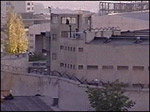 AFP: Five years after seven Bahai leaders were arrested in Iran, members of the faith are campaigning to increase attention to their plight in hopes that authorities will release them.
AFP: Five years after seven Bahai leaders were arrested in Iran, members of the faith are campaigning to increase attention to their plight in hopes that authorities will release them.  WASHINGTON (AFP) — Five years after seven Bahai leaders were arrested in Iran, members of the faith are campaigning to increase attention to their plight in hopes that authorities will release them.
WASHINGTON (AFP) — Five years after seven Bahai leaders were arrested in Iran, members of the faith are campaigning to increase attention to their plight in hopes that authorities will release them.
The seven informal leaders of the Bahai faith, which has no clergy, were arrested in 2008 and given 20-year prison terms. The religion was founded in Iran in the 19th century and is anathema to the Islamic clerical regime.
Rainn Wilson, an actor best known for his role in the US version of the television series “The Office,” said that the seven Bahais were only seeking to return home to their families.
“There is this misconception that Iran doesn’t care what other governments and organizations think about it, but they do care,” Wilson, who is Bahai, said at a reception for the prisoners in Washington on Monday evening.
“They care greatly about the fact that they’re perceived as being so backward and inhumane and unjust,” he said.
“And if we can raise that pressure, and if it can come from a governmental level and from places around the world, that could help facilitate getting these seven released.”
The Bahais, who believe in unity among religions and equality between men and women, consider the Bahaullah, born in 1817, to be the latest prophet sent by God.
The faith now has seven million followers including 300,000 in Iran, where its members are denied higher education and government posts.
Thomas Melia, a State Department official who deals with human rights, said that at least 110 Bahais were imprisoned in Iran and more than 520 others are awaiting appearances in court.
“The repression and discrimination of religious minorities in Iran… is simply unacceptable even as it continues to mount before our very eyes,” Melia said.
Iran tried the Bahai leaders on charges of spying for foreigners, spreading corruption, undermining Islam and cooperating with rival Israel.
The Bahaullah was sent into exile and set up the religion’s headquarters in Haifa, which is now in Israel.
Roxana Saberi, an Iranian-American journalist who spent months in prison in 2009 on charges of espionage, said that she shared a cell with two women among the Bahai leaders and that they later made her a bracelet from her towel.
“I have no doubt that they have helped lift the spirits of their cellmates, as they did in the previous prison where they were,” Saberi said. “They helped soften even the most hardened criminals with their kindness and compassion.”


